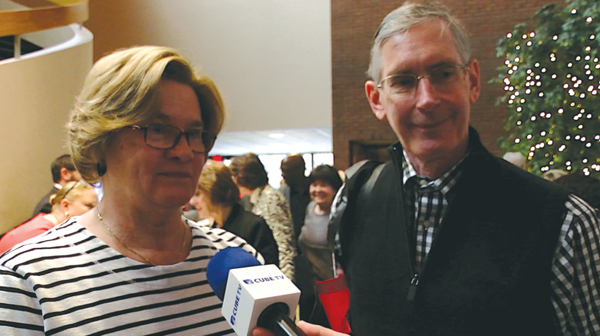Sue and Jim Steinhagen of Troy, Mich., were among the attendees at the ReinventingMiRetirement workshops in October.
Once retirement planning was pretty simple – your employer offered a set pension every month, Social Security benefits were determined, and with a little foresight you had some savings earmarked for the day you quit work.
Today, people are struggling with defined contribution plans and 401ks, waiting longer to qualify for full Social Security benefits, and either moaning at paltry interest on their savings accounts or fretting at the ups and downs of the stock market.Enter credit unions that are working to help members cope with a more complicated world. Two examples are Michigan credit unions involvement with ReinventingMiRetirement and the National Credit Union Foundation's encouragement of retirement fairs.
Recommended For You
ReinventingMiRetirement is a major initiative involving financial, insurance, community and nonprofit organizations, according to Ken Ross, EVP/COO at the Michigan Credit Union League.
In October, workshops were held in nine cities around the state with guest speakers, workshops, one-on-one checkups, information booths and a 100-page toolkit.
The session in the Detroit suburb of Troy, Mich., for example, drew 300 people, Ross said. The Michigan league saw this as a kickoff for future programming.
"There's absolutely a need," Ross said. "A big part of the focus is equipping people with information on how to evaluate financial service professionals and understand what they're going to provide and what they're going to charge."
He added, "Not just in Michigan, but you pick up a newspaper any day of the week and read about someone getting caught gaming someone. There's certainly increasing traffic in those who want to take advantage of people who don't understand the financial products they're buying."
Part of it also is people don't plan for their retirement early enough, Ross said. They get into their 40s or 50s or 60s, and what they need to have for a comfortable retirement is just eye-popping, he noted.
Some demographics underscore the need. About two million of Michigan's nearly 10 million residents are 60 and older. By 2030, nearly 25% of the state's residents will fall into that category. Ross said those statistics aren't unique across the country.
The National Credit Union Foundation has responded by encouraging retirement fairs. Participants visit seven booths, each presenting a series of questions. For example, a booth might focus on housing in retirement and another on travel and leisure.
A participant receives a number indicating whether they are below average, average or above average in that category. At the end of the session, the results are pulled together to assess what that person might do to bring their expectations in line with reality. For example, perhaps they should work two years more than planned.
Mark Lynch, a consultant for NCUF, suggested a number of would-be retirees may indeed be forced to work longer than they expect.
"One really scary statistic we found when we did research is that 49% of people are currently not saving anything for retirement," Lynch said. "Even if they've saved something, they don't think they've saved enough.
He said there are two things behind this scenario: a person's income has not increased. Half the work force is making $25,000 a year or less. For that segment, it's a choice between paying the rent and putting food on the table, or saving for retirement.

More than 300 people attended the retirement fair including visitors who checked out the transportation booth.
The second factor, Lynch continued, is that previously, people didn't have choices. When you started work, you were told you were now in the pension plan, and this is what you would contribute. Now, with 401ks, people have choices. Some young people will likely elect not to contribute, according to some financial experts.
Lynch suggested credit unions partnering with employers, community groups and others to offer retirement planning advice. He believes credit unions can play a very powerful role.
"When a member or potential member says, 'I only make $25,000, and I can't really save for retirement,' you have the opportunity to say – especially to potential members, 'Why don't you talk to one of our staff? Let's see if you brought all of your financial business to the credit union, all your loans in particular, and you refinanced at a lower interest rate; if we might be able to save you some money you could then use toward your retirement savings.'"
© Touchpoint Markets, All Rights Reserved. Request academic re-use from www.copyright.com. All other uses, submit a request to [email protected]. For more inforrmation visit Asset & Logo Licensing.






